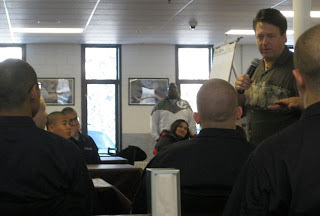 Today I went along to hear him talk with about 160 cadets at the Alaska Military Youth Academy at Fort Richardson. Their website gives an overview:
Today I went along to hear him talk with about 160 cadets at the Alaska Military Youth Academy at Fort Richardson. Their website gives an overview:These are kids who have experienced difficulties in their young lives."The Alaska Military Youth Academy's ChalleNGe Program is designed to meet the life coping skills and educational needs of 16 to 18 year old Alaskans. The Youth ChalleNGe program is a 22-week residential school based on the traditional military training model.Cadets are instructed in the following areas: Life Coping Skills, Academic Excellence, Job Skills, Responsible Citizenship, Leadership/Followership, Health & Hygiene, Physical Fitness, and Service to Community. In addition to these skills, cadets work toward the completion of a GED or High School Diploma."
"Who can attend the AMYA ChalleNGe?And Brent was raring to go. His favorite audience, he said. Alternative schools, places with kids who have extra obstacles in their lives. And he had their close attention for two hours.
Young Alaskan men and women 16 through 19 years of age may apply to AMYA for admission to a ChalleNGe Program class. Applicants must be Alaska residents, must provide proof of United States citizenship or legal residency, may not have a traditional high school diploma or GED, be willing to commit to a drug, alcohol and tobacco-free life while enrolled, be free of legal entanglements and must be volunteers.
No young man or woman can be "sent" to an AMYA ChalleNGe course. Most importantly, applicants must have a desire to move their lives in a positive direction and must have made the decision to make a healthy change in their lives."
They wear uniforms, answer questions, "Sir, yes sir!" They sit up straight. It's a very military setting. Brent is totally unmilitary. He's real and his combination of experiences - his own childhood difficulties but also being associated with movies all the kids had seen (they nearly all raised their hands to say they'd seen Shawshank Redemption and Matilda) - combined with his transparent delivery, was powerful. When he asked questions, kids raised their hands to respond. In a setting with a lot of formal military discipline (probably helpful for most of these kids) Brent was a brief moment of piercing love and about issues these kids know too well.

At the end, kids were lined up to shake Brent's hand and tell him thank you and that one part or another of the program had connected with them. It was very powerful and I'm glad I was able to attend.

This program is run by the Alaska Department of Military and Veterans Affairs. They have lots of volunteer mentor positions. Anchorage folks, these are kids that a mentor could really help.
"Each class of the Academy consists of 17.5 months in two phases. The first is residential consisting of the most comprehensive 2 week evaluation of candidates for the program included with the remaining 20 weeks of immersion into a quasi-military environment. The second phase is the ChalleNGe post-residential phase continuing the year of aftercare. During the residential phase the adult mentor visits the Cadet, writes letters, attends special events, tutors and takes the Cadet on pass. This caring, responsible adult friendship increases the Cadet's chance for continued success.
During the one year of aftercare (which follows the graduation from the residential phase) the Mentor and Cadet continue regular weekly contact by face-to-face visits, telephone, letter and email. Both the Cadet and the Mentor send reports monthly to the aftercare office reporting the Cadet's placement on the job or in school."
Think about it. Mentoring makes a difference.
In one of the largest studies in the field (Tierney & Grossman, 1995), 959 youth who asked to be matched with a Big Brother/Big Sister during 1992-1993 were randomly assigned to one of two groups: a mentoring group or a control group (the latter youth were put on the 18-month waiting list). Both groups were interviewed when they applied for the program and 18 months later, and completed self-report indices. The study examined several broad areas that mentoring might affect: antisocial activities, academic performance, attitudes and behaviors, relationships with family, relationships with friends, self-concept, and social and cultural enrichment. The results indicated that "littles" (mentees) who met with their "bigs" (mentors) regularly for about a year were 46% less likely than the control group to start using illegal drugs, 27% less likely to start drinking, 52% less likely to skip a day ...[The preview of the article ended there, sorry.]



I mentored at AMYA-- my cadet is now 24 and has a master's degree. She is brilliant. She was smart before she went in and it prepared her for the US Army-- she said that she had a fairly easy time in basic training.
ReplyDeleteI was thrown off by the "Ma'am, yes ma'am" thing-- she likes to still tease me and do that to me because it literally throws me off balance and I never know how to respond. She'll probably teach her children to do that to me, too, given how amusing she finds my reactions.
Nice Tea, the mentoring I've done was incredibly rewarding. The kids are so appreciative that someone cares about them, even if they don't always show it.
ReplyDelete